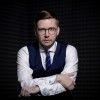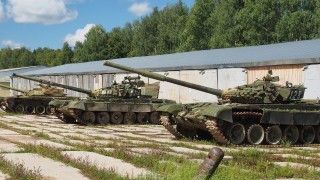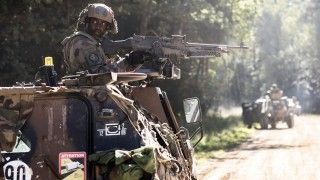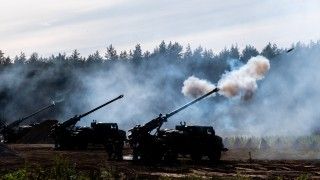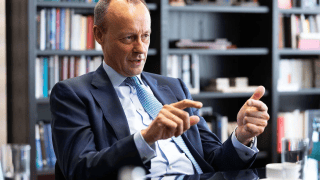- WYWIADY
- WIADOMOŚCI
Belousov Replaces Shoygu. “Putin wants to implement a policy of armed imperialism” [INTERVIEW]
“Not only does Putin want munitions to be manufactured, which can always be certified on paper, but first and foremost, the munitions must reach the front line. In essence, this can be interpreted as a desire to continue the policy of armed imperialism, but it is just an attempt to make it more effective”. - this is how Dr Michał Patryk Sadłowski (University of Warsaw) commented on the Russian President’s decision to change who was appointed the Minister of Defence of the Russian Federation.
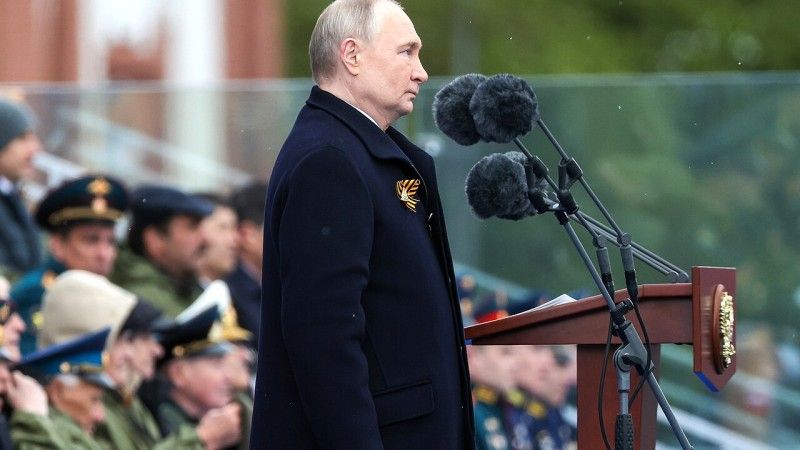
The last two days resulted in relevant changes among the top Russian officials. Sergei Shoygu being dismissed as the Minister of Defence, and replaced with Andrei Belousov is a move that is worthy of a detailed analysis. Why is it that Vladimir Putin decided to implement such a change right now? Does he still trust Shoygu? What are the specific objectives that could be defined for the new Russian Defence Minister? Dr Michał Patryk Sadłowski, University of Warsaw, President of the Gabriel Szerszeniewicz Eastern Law Institute Foundation, spoke about all this in an interview with Defence24.pl.
Michał Górski, Defence24.pl: Andrey Belousov has replaced Sergei Shoygu as the Russian defence minister. On your X timeline, commenting on this, you have written that the new head of the Russian MoD “is not a typical, ordinary economist”. What else can be said about him?
Dr Michał Patryk Sadłowski, University of Warsaw, President of the Gabriel Szerszeniewicz Eastern Law Institute Foundation: In matters of the state system, and especially in the sphere of administration of a state with a system as personalised as Russia, every detail counts. Andrey Belousov (born 1959) is not your ordinary, typical economist, and there are some reasons for that. Firstly, his father, Rem. A. Belousov, is one of the most famous Soviet economists involved in the so-called Kosygin reform, namely Rem A. Belousov. And it is noticeable in Andrei Belousov’s numerous statements that the new head of the Russian Ministry of Defence has repeatedly warned against repeating the mistakes of the USSR in the economic sphere, e.g. over-militarisation of the budget, or in general, killing off the civilian sector of the economy.
The family’s status led Andrei Belousov to graduate from the best Soviet schools and universities (the Lomonosov Faculty of Economics of the Moscow State University and then the Central Economic and Mathematical Institute of the Academy of Sciences of the USSR), specializing in mathematics, physics, finance and especially forecasting in economics. Thanks to the above he launched a successful academic career - first he became an economic scientist, then got involved as a practitioner of economics. As of 1999, in the role of an expert or consultant, he has been supporting the key Russian officials responsible for the economy. Meanwhile, as of 2006, he began to hold high posts in this area (including Deputy Minister of Economic Development; Minister of Economic Development; senior official in the Presidential administration, and Deputy Prime Minister).
Not only are we dealing with an economist here, as he is also an economic scientist, practitioner, experienced high-level official, a supporter of statism and a man who is on good terms with other representatives of the so-called economic bloc. He is also trusted by Vladimir Putin. All in all, the head of the Ministry of Defence, alongside the Russian President, and the Chief of Staff in the Russian Armed Forces has a lot to say, at least formally, when it comes to the potential use of nuclear weapons. By the way, the said trust may also stem from the fact that Belousov has been one of a few economists who successfully issued a forecast on the 2008 economic crisis, which is one of the highlights of Putin’s political career. The Russian president was convinced then, that close cooperation between technocrats-economists under close guidance of the highest state authorities allows even deep economic perturbations to pass.
Noteworthy, Belousov’s younger brother, and his son, work in the domain of technology and economics as well. In contrast, the mother of the new head of the Defence Ministry, Alisa (maiden name Travnikova), was a doctor of chemistry. She was also the daughter of the founder of the famous Travnikova Garden in Moscow. This shows that Belousov himself comes from the high Soviet state, scientific and cultural elite.
Why is the change happening right now?
The change is a ramification entailed by the new Presidential term of office that Putin just started. This is related to a refreshing process, concerning the top officials in the Council of Ministers - that Council would be responsible for pursuing the state development programme, announced by Vladimir Putin in front of the General Assembly, on 29th February this year.
Shoygu himself is seen by most Russians who support the war with Ukraine and Putin’s foreign and security policy as a politician and official who is responsible for the Russian war failures following 24th February 2022. There has also been dissatisfaction within the Russian Armed Forces regarding Shoygu, tied, for example, to problems with the ammunition supply. If this is not enough, numerous corruption scandals have seen his involvement, tied to mismanagement or blatant diversion of funds from the defence budget to private entities working in the sphere of military housing and real estate. And this, in turn, hit hard at the Kremlin’s narrative of the need for Russians to increase their war effort. In this context, we must also put the spotlight on the premiere of the film „Traitors”, by one of Alexei Navalny’s main collaborators, Maria Pervichi. The motivation behind this multi-episode film is to create discontent among Russians in the socio-economic sphere. All this is also linked to the detention of Deputy Minister Timur Ivanov.
What are the specific objectives that could be defined for Belousov?
Firstly, an audit of the Ministry of Defence’s finances, investments and forms of cooperation with other ministries. Briefly summing it up: Not only does Putin want munitions to be manufactured, which can always be certified on paper, but first and foremost, the munitions must reach the front line. In essence, this can be interpreted as a desire to continue the policy of armed imperialism, but it is just an attempt to make it more effective.
Besides, we must remember that the war has not been going on since 2022, but since 2014 (not to mention other areas of Russian military activity in the world). On one hand, it is currently a major problem and challenge for the Kremlin, on the other - it is an effective tool that can be used to keep yielding power. At the moment V. Putin, to stay in power, must continue the war and be successful enough (first of all territorially, and preferably still treaty-based) to internally guarantee his continued systemic, political and ideological persistence. In this setting, the current personnel reshuffle is also a signal to the elites of the Western states: we are ready for a long war, so your aid to Ukraine is no longer sufficient. Ergo: let’s better make a deal on Ukraine.
Is the change taking place a kind of symbolic finalization of the transformation of the Russian economy into a war economy?
I am not an economist, but I think it is more of an attempt to organise a part-war economy. So, on one hand, it is about increasing the efficiency of the war-industrial sector, which is what Belousov will be working on with Deputy Prime Minister Denis Manturov, but on the other hand, it is about the economy providing for the basic needs of the population. On top of this, another important thing is the need to maintain and develop trade and investment channels with countries that do not apply sanctions against Russia. Putin understands perfectly well that discontent on socio-economic grounds can develop into social discontent, which in turn can develop into political discontent. Ultimately this would lead to a collapse of power. Therefore, it is necessary to maintain a balance between the militarization of the economy in selected spheres, the mobilization of potential to cover the rising costs of the war and, on the other hand, to maintain a minimum of development and mainly the level of consumption to which Russians have become already accustomed.
In the Russian elite circles, there’s a prevailing belief that Russia didn’t just lose World War I due to military defeats, but primarily due to the breakdown of support systems, particularly in logistics and supply chains. On the contrary, World War II is widely acknowledged as a spectacular, and efficient demonstration of successful war-time industrial mobilization. It’s evident that V. Putin and his inner circle, reflecting on the lessons of perestroika and the USSR’s dissolution, have arrived at the following conclusion: even in challenging circumstances, pursuing a firm, decisive political strategy (emphasizing centralization and ideological unity) can salvage both power and the state. In this scenario, the significance of specialist technocrats (bureaucrats), primarily economists, who ensure state stability under stringent political oversight, cannot be overstated.
Coming back to the former Russian Minister of Defence, Sergey Shoygu. We know that he will replace Nikolai Patrushev as Secretary of the Security Council. Can we see this change as a political demotion for Shoygu?
It is hard to say. On one hand, he’s stepping down from the Ministry of Defence, but on the other hand, he’s assuming the role of secretary of the Security Council (SC), which has been a crucial institution within the Russian system in recent times. Additionally, discussions were held there regarding pivotal strategic and ideological policy decisions of the Russian Federation. For instance, following a meeting with the leader of the PRC, V. Putin specifically briefed the Security Council about the details of the encounter. It was also reported that V. Putin instructed every member of the Security Council to voice their perspectives before the invasion of Ukraine.
In addition to this, Shoygu will serve as the deputy head of the War-Industrial Commission, a body crucial for coordinating cooperation among key ministries to counter sanctions and bolster the war effort. And he will also be the head of the Federal Service for War-Industrial Cooperation. All of this indicates that V. Putin hasn’t lost confidence in S. Shoygu’s political abilities but has instead determined that, in professional bureaucratic terms, S. Shoygu may no longer be capable of effectively carrying out his duties. The Russian President evidently can distinguish between these spheres of activity. In this context, it’s evident that he is integrating the younger generation—those born in the 1960s and 1970s—into the power elite.
Referring to Belousov’s nomination and the post on X, you mentioned that Putin aims to replicate the manoeuvre from 2020. What did you mean, specifically?
In January 2020, Mikhail Mishustin became Prime Minister of Russia. Dmitry Medvedev was succeeded as head of the central administration not by a politician of similar standing, but primarily by a civil servant—a bureaucrat, technocrat, who specialized in digitalizing administration, notably in modernizing tax processes. Drawing from Russian history, we recognize that the Tsars were well aware of this interdependence. They understood that the efficient appointment and collection of taxes served as fundamental tools for expanding the Empire. Without that, no possibility of waging a war exists.
Manoeuvre with Mishustin did prove to be successful. The so-called economic bloc is effective, from the point of view placing the Kremlin’s interest at the pedestal. It is also important to note that this circle of technocrats, with a pro-state orientation, has, so far, limited political ambitions and a rather weak base in other power structures and the public sphere, so Putin feels safer with them. For the time being, he does not regard them as a serious threat to himself.












